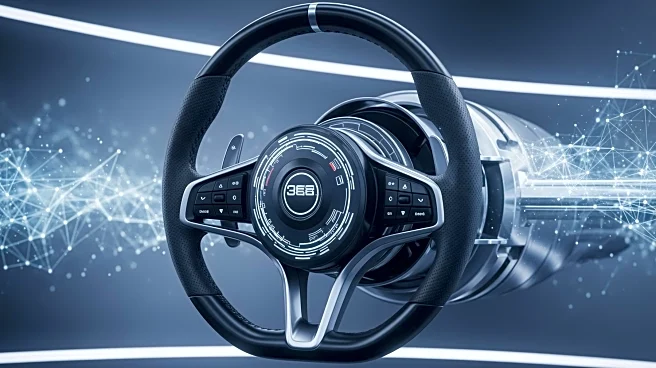What's Happening?
China Automotive Systems, Inc., a prominent supplier of power steering components in China, has announced a strategic cooperation memorandum of understanding (MoU) with KYB-UMW Sdn Bhd in Malaysia. This
agreement aims to localize the production and transfer of technology for electric power steering (EPS) systems and mechanical steering gears (MSG) in Malaysia. KYB-UMW, a joint venture between KYB and UMW, is a key player in the Malaysian automotive industry. The collaboration will initially supply products to Perodua, Malaysia's national automotive brand, and aims to expand into the OEM and aftermarket sectors across the ASEAN region. The partnership will leverage Hubei Henglong's advanced steering technology and KYB-UMW's local manufacturing capabilities to enhance competitiveness and create a smart manufacturing ecosystem in Malaysia.
Why It's Important?
This strategic partnership is significant as it represents a shift from supply chain reciprocity to value chain co-creation between China and Malaysia. By localizing production, the collaboration is expected to strengthen the regional manufacturing and supply system, providing high-quality steering solutions to OEMs and the replacement parts market. The move is part of Hubei Henglong's internationalization strategy, aiming to penetrate the ASEAN markets with advanced steering technology. This development could enhance Malaysia's automotive industry by introducing high-value components and fostering regional growth. The partnership also highlights the growing economic ties between China and Malaysia, potentially leading to increased investment and technological exchange in the region.
What's Next?
The new advanced manufacturing plant (SP25) in Malaysia, expected to be operational by 2026, will play a crucial role in this partnership. It will focus on producing steering system products using Hubei Henglong's technology. Both parties plan to explore further opportunities in the OEM and aftermarket sectors, aiming to extend their collaboration benefits across the ASEAN region. The success of this partnership could encourage similar collaborations, further integrating the automotive supply chain in Southeast Asia and enhancing the region's competitiveness in the global market.
Beyond the Headlines
This collaboration could have broader implications for the automotive industry in Southeast Asia, potentially setting a precedent for future Sino-Malaysian partnerships. The focus on smart manufacturing and technology transfer may drive innovation and efficiency in the region's automotive sector. Additionally, the partnership could influence regional trade policies and economic strategies, promoting a more integrated and competitive ASEAN market.










